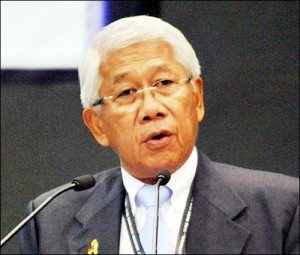PH security concerns shifting to external threat
MANILA, Philippines—When he assumed office as defense chief in 2010, retired Army commander Voltaire Gazmin, one of the most trusted aides of the late President Corazon Aquino, had the country’s internal security problem as a priority mission.
But long-dormant territorial issues suddenly came up while the government, now helmed by Aquino’s only son, Benigno Aquino III, is trying to do some housekeeping, such as sealing a peace accord with Moro secessionists and fighting corruption.
Tensions in the West Philippine Sea (South China Sea) have brought to the fore a changing security environment in the Asia-Pacific region that the government suddenly has to give the same attention to territorial defense as it does to internal security threats, Gazmin told the Inquirer on Tuesday.
The Aquino administration now has to deal with the reemergence of traditional security threats.
Panatag, Ayungin
Article continues after this advertisementIt all began with Chinese fishermen poaching at Panatag Shoal (Scarborough Shoal) off Zambales last year, which escalated into a maritime standoff between China and the Philippines.
Article continues after this advertisementMore recently, the Chinese made their presence felt at Ayungin Shoal (Second Thomas Shoal) in the Kalayaan Islands, appearing bent on claiming the area as theirs even though it was 196 kilometers from Palawan, well within the Philippines’ 320 km exclusive economic zone.
Chinese vessels remain at Ayungin Shoal, under the protective watch of a Chinese frigate.
The government is “concerned about the incident or the actions undertaken by the Chinese,” Gazmin said.
Almost every day, members of the Aquino administration’s security cluster exchange notes and updates on the situation in the disputed territories in the West Philippine Sea.
But there’s no need to convene the National Security Council just yet, Gazmin said.
“We think the way we are handling the problem is the correct way of doing it,” he said.
Regional dominance
For security analyst Jose Antonio Custodio, the worsening territorial dispute is more about a race for dominance in the Asia-Pacific region between China and the United States.
“If you ask me, it’s not even about natural resources anymore,” Custodio said in a recent interview.
It’s more about which superpower will be the dominant one in the region, he said.
The Philippines, a close US ally, has the fortune, or misfortune, of lying right along China’s so-called first island chain, Custodio added, stopping short of saying the archipelago is an obstacle to China’s plan for regional hegemony.
Nice location, but…
Gazmin would not go on the record when discussing geopolitics. But when asked if the Philippines’ geographical location made the country lucky or not, he said: “We are lucky because [we have a nice location]. Given the situation, we are very unlucky because [we are caught between them in their struggle for dominance here].”
A battle-hardened soldier, Gazmin readily admitted that the Philippines cannot match the military might of China. That is why, he said, the country relies on the Mutual Defense Treaty, the help of the United States and diplomatic efforts to resolve its territorial dispute with China.
“Defense would not necessarily mean the military aspect,” Gazmin said.
The United States has been helping the Philippines with intelligence information, providing for example, information about unidentified vessels within the vicinity of Philippine territory, Gazmin said.
“That is facing reality,” he said.
‘Civil way’
The Philippine military’s capability upgrade is expected to be completed in the next five years—all the while that China has been sending frigates and other vessels to disputed territories in the West Philippine Sea.
Gazmin stressed that seeking international arbitration is the “civil way” of handling the problem, taking the diplomatic, political and legal route to resolve the issue with finality.
But he is also counting on the support of the public in protecting the country’s sovereignty.
“(Filipinos) have to care. This is their land. Everybody should be involved in this. Every single individual should be involved in the issue of sovereignty,” Gazmin said.
He called on the media to help in informing and educating the people as the defense and the foreign affairs deparments have been “transparent” about the territorial dispute.
Different priorities
For sure, he said, different sectors of society would have different priorities.
Those who need food and jobs might not grasp the extent of the problem now, Gazmin said.
“But eventually, if those requirements are satisfied, the people will see the value of understanding the issue on sovereignty. For example, food security. Where will we get the fish we need if someone else has claimed our territory?” Gazmin said.
